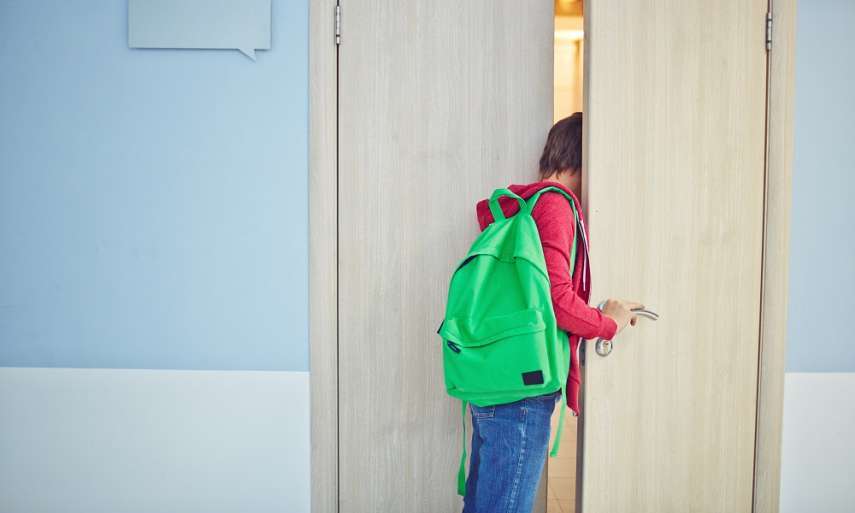This is an edited version of an article that was originally published in the March 2011 print edition of Teacher.
If we really want to improve student achievement we need to focus on the person who gently closes the classroom door and performs the teaching act – the teacher – but to do that, says Russell Boyle, we need to open those classroom doors.
Educational research confirms something that teachers have probably always known: the teacher is the single most important driver of student achievement, after family background. According to John Hattie, what makes the greatest difference in a student's achievement is the teacher, accounting for about 30 per cent of the variance in student achievement. Hattie also notes that it's what students bring to the table that accounts for about 50 per cent of the variance.
As Hattie nicely put it in ‘Teachers make a difference: What is the research evidence?' at the 2003 research conference of the Australian Council for Educational Research, successful education comes back to ‘the person who gently closes the classroom door and performs the teaching act – the person...who is alone with students during their 15,000 hours of schooling.'
What I love about going to school on Open Day is that the door that I might otherwise gently close is well and truly open. Open Day is the one day of the year when my teaching and the teaching of all my colleagues is implicitly valued as that single most important driver of student achievement, after family background. I know, on Open Day, how important it is to be well groomed and professionally dressed. I know that having posters on my classroom wall, graffiti-free furniture and an empty recycling bin are important signs to prospective parents of a well-organised teacher who cares for his students' learning environment. I know why my senior executives remind me of these things and I do my best to attend to them. They are not, however, the reasons why prospective parents visit my classroom on Open Day. Parents come to my room to see if I'm an effective teacher.
Is my subject knowledge comprehensive and deep? Do I challenge and engage my students? Are my explanations lucid? Am I able to anticipate and improvise, as required? How well do I monitor student problems, assess their level of understanding and provide pertinent, useful feedback? Does my passion for my subject and for learning shine through? Would they like to see their child study mathematics in my classroom?
These, by the way, can also be sheeted home to the research of John Hattie that addresses the characteristics and attributes of novice, experienced and expert teachers.
Every school has a diverse range of teachers: novice teachers and experienced teachers, young teachers and old teachers, good teachers and maybe not so good teachers, and expert teachers. We know that teachers make a significant difference to student achievement and that if we can grow the proportion of expert teachers in the teaching profession then we'll lift student achievement and increase economic growth.
Expert teachers are our most effective teachers. The greatest gains in student achievement come from the classrooms of our expert teachers. The impact of effective teaching on student achievement is cumulative. Having one expert teacher is good but having a number of expert teachers over successive years has a dramatic effect on student achievement.
Students and parents readily identify the expert teachers in their school. Parents will often ask for a particular teacher for their child. Sometimes they will also request that a particular teacher not be assigned to teach their child. Senior secondary students have been known to change their subject selection on the basis of who they think will likely teach or not teach particular subjects. This is most unfortunate. Students should choose their senior courses on the basis of the subjects they are good at, that they enjoy and that they need for their post-school ambitions.
School principals and even teachers themselves can point to the expert teachers in their school. But our school leaders seem to lack the desire, or perhaps the courage, to formally acknowledge expert teachers and to identify and work with mediocre teachers for improvement.
Our Commonwealth and state or territory politicians and political parties generally lack the policies needed to deal successfully with this issue: policies that place teacher quality at the centre of school reform in this country. Our political leaders find it easier, perhaps more politically palatable and certainly more popular, to fund new school buildings and supply students with new computers. Such initiatives, though welcome, will not have a major impact on student achievement.
We know from Hattie's 2003 research that family background and what students bring to the classroom accounts for the largest share of the variance in student achievement, around 50 per cent. Hattie's research also found that schools account for a mere five to 10 per cent of the variance in student achievement while school principals account for another five to 10 per cent of the variance. Spending more money on schools or increasing school principal salaries will not therefore produce a significant improvement in student achievement.
According to Ben Jensen's 2010 Grattan Institute report, Investing in Our Teachers, Investing in Our Economy, a 10 per cent increase in teacher effectiveness would lift Australia and Australian students into the highest-performing group of countries in the world. Improvements of this magnitude are both possible and achievable but only if we shift the policy focus from schools to teachers. The productivity of Australian workers and the longer-term economic growth of the nation depend upon improvements in teacher quality and teacher effectiveness.
If our major policy focus is to improve student achievement by improving teacher effectiveness – accounting for 30 per cent of the variance in student achievement – we must attract higher-quality applicants to the teaching profession, improve our teacher education institutions and courses, esteem and grow those teachers who demonstrate expert potential, and mandate teacher development programs for less effective teachers. And we must keep our expert teachers in the profession and in the classroom. Rewarding expert teachers with the status and salary currently enjoyed by school principals would go a long way toward achieving this aim.
The highest paid staff members in every school should be its expert teachers. Why do we want expert teachers in our classrooms? Because expertise begets expertise.
The problems caused by poor performing teachers must also be addressed. Good teachers are disheartened when they see less effective colleagues receive greater recognition. Sadly, this happens all too often in our schools. Research conducted by the Boston Consulting Group in 2003 for the then Victorian Department of Education and Training found that up to 30 per cent of teachers are considered by school principals as being either below-average or significantly underperforming, yet, as Jensen notes, ‘nearly all Australian school principals report that they would not take steps to alter the monetary rewards of a persistently underperforming teacher.'
Australian teachers typically undergo a review of their performance each year. The problem with annual performance reviews, though, is that they offer no rewards to those who perform well as teachers and few consequences for those who perform badly. Moreover, you simply cannot measure a teacher's effectiveness in the classroom by compelling them to undertake a written performance review each year.
Good teachers like to observe and strive to emulate the performance of better teachers. They reflect continuously on their practice, which is why they are good and how they improve. But much of what school systems and principals currently demand from teachers in performance reviews has more to do with the rhetoric of education than with performance in the classroom. And most of this is couched in meaningless education jargon and managerial language. At best, performance reviews maintain the status quo in schools. At worst, they protect incompetence, as poor-performing teachers need only to write well, interview well and speak the language of education in order to survive and, dare I say, flourish.
So, how should school principals review the performance of teachers? By opening the classroom door and spending time in their classrooms, just as parents do on Open Day.
And how can principals inspire their staff to aspire to become more effective teachers? The best principals lead by example from the classroom. Every school principal should have a teaching allotment; they should model expert teaching from their own classroom.
There is nothing that I do in my present school, or have done at other schools in which I've worked, that is more important than my classroom teaching. While aspects of my role as a curriculum dean are important they pale into insignificance when compared with my teaching. I may be a leader in many forms or guises but my leadership may be validated only against my performance in the classroom.
What teachers do after closing the classroom door, four to five periods a day, five days each week, changes lives. Open Day is a good time to remind ourselves of this. We should explicitly, rather than implicitly, value and reward our expert teachers, and we should do so regularly, not just on Open Day, as effective teaching is the best route to improved student achievement and greater economic prosperity.
References
Boston Consulting Group. (2003). Schools Strategy Workforce Development. Melbourne: Victorian Department of Education and Training.
Hattie, J. (2003). Teachers make a difference: What is the research evidence? 2003 research conference of the Australian Council for Educational Research – Building teacher quality: What does the research tell us? Melbourne: Australian Council for Educational Research.
Jensen, B. (2010). Investing in Our Economy. Melbourne: Grattan Institute.
This is an edited version of an article that was originally published in the March 2011 print edition of Teacher. The author biography remains unchanged and may not be accurate at this point in time.



